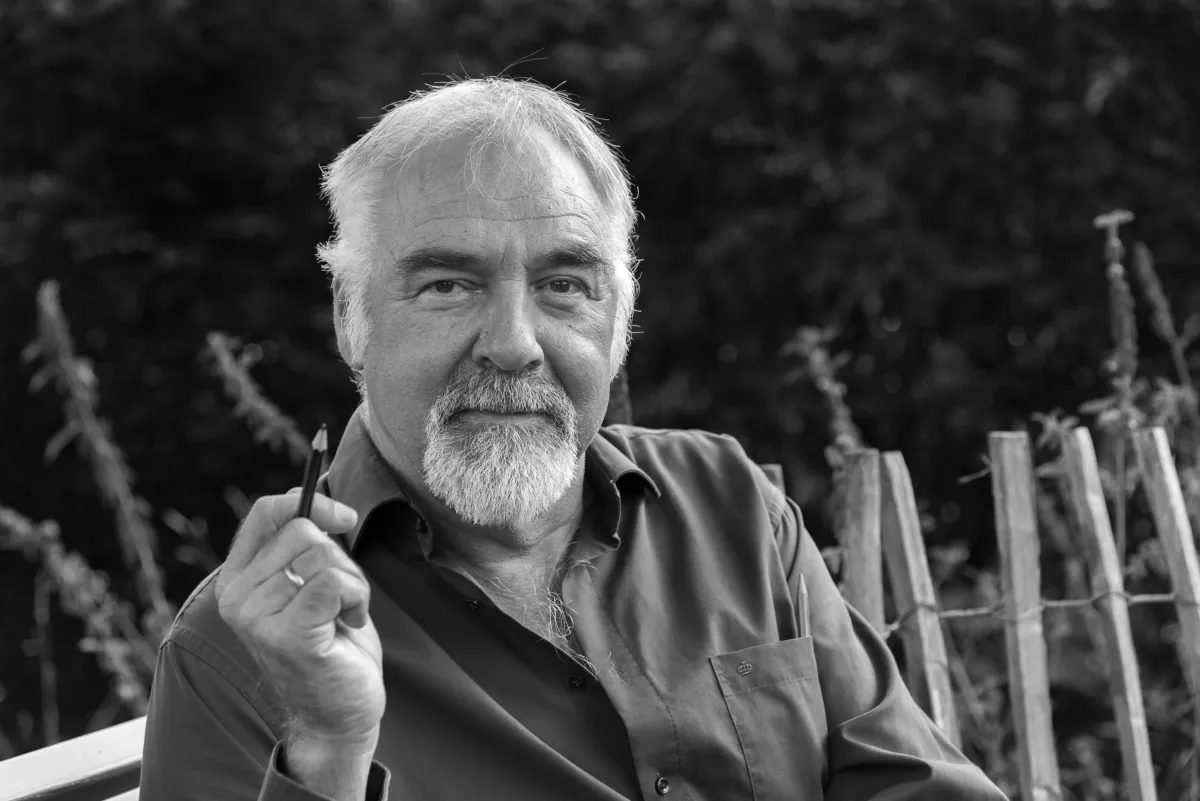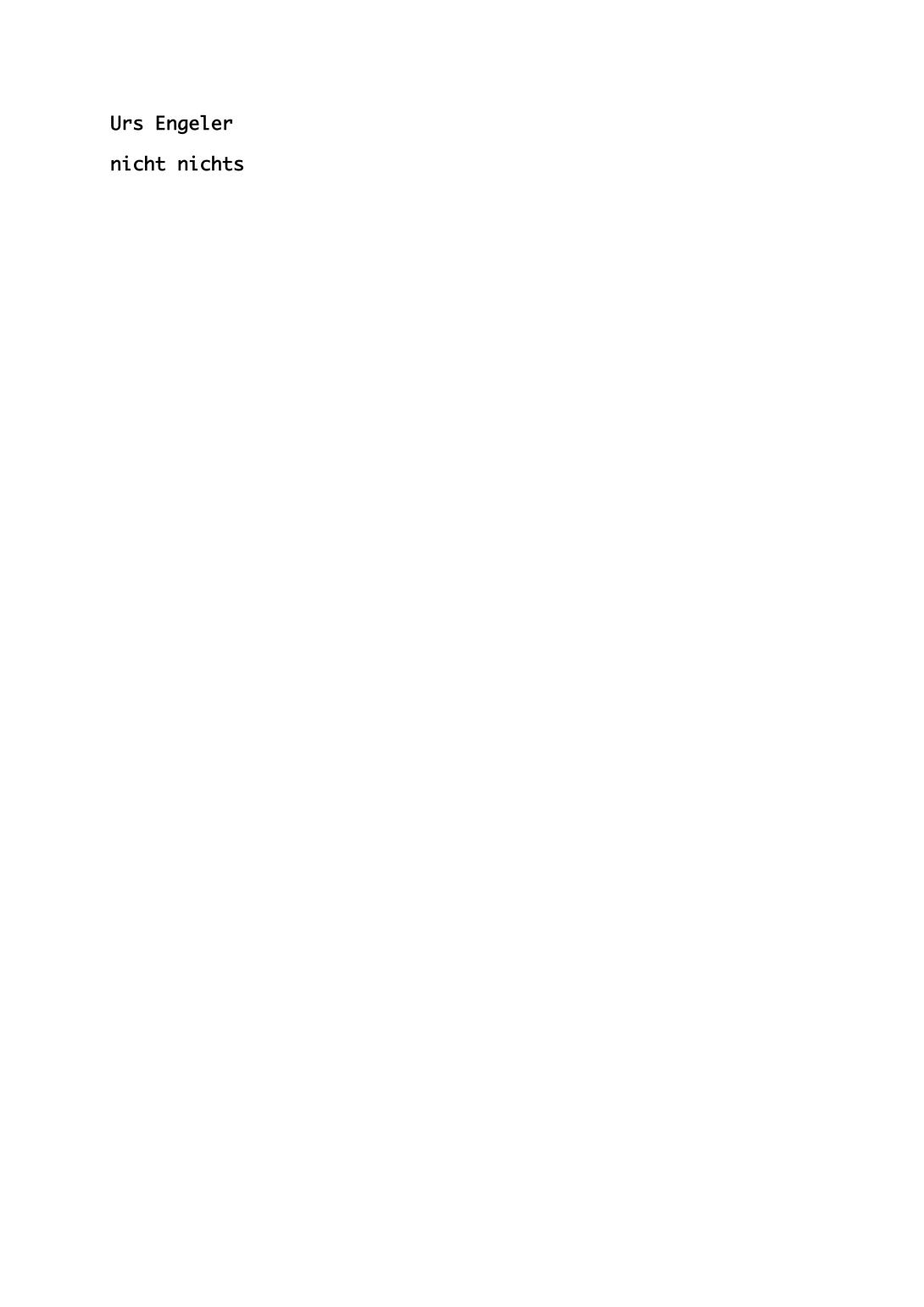Visual and perceptual spaces

Galant Lies: the poetry column under the direction of Alexandru Bulucz - loosely based on Johann Christian Günther, the baroque poet on the threshold of the Enlightenment, who mocked poets with the words that they were "only gallant liars". Poetry will be reflected on and presented here: in reviews, essays, monthly poems and occasionally also lists of best poems.
Urs Engeler - the man is a legend of German-language literature, particularly of the poetry scene. Born in Zurich in 1962, he is best known as a founder of magazines and publishing houses. At odds with the mainstream literary scene from the very beginning, he has nonetheless achieved great success; not only discovering and promoting talent, but also becoming a focal point for established names. The literature he gives a stage to is, to a large extent, just like his distribution style: idiosyncratic, unconventional and experimental.
Since 1992, when Urs Engeler founded the literary magazine "Zwischen den Zeilen", a network of almost confusing publication platforms has grown up around him, most recently including the so-called "Armengenossenschaft", an online magazine whose ironic name seems to reflect the precarious existence of many writers. "Armengenossenschaft" has replaced the literary magazine "Mütze", which in turn had succeeded "Zwischen den Zeilen". This also marks the transition to digital publishing.
The first of the Engeler publishing houses was founded in 1997 with "Urs Engeler Editor", publishing more than 150 books on such varied subjects as literary theory, philosophy, poetics, psychoanalysis, poetics and poetry before shutting down in 2009. This was followed by the "roughbooks" series, currently comprising 65 volumes - "poetry in digital print and direct distribution", as the website states, i.e. available via subscriptions or from the publisher. The small format and appearance of the series have become an unmistakable trademark of Engeler Verlage: The work starts on the cover, the numbering adorns the spine - a simplicity that invites you to focus on the essential: the literature itself. Initially, the "roughbooks" didn't even have an ISBN. One can speculate that an ISBN had to be introduced because applications for literary grants often require a certain number of previous publications; no ISBN means no publication. In addition to this series, there is also "Das Versteck", the "Theorie-Reihe" (18 volumes) and no backlist, but a "Blacklist" (12 volumes).
This literary universe contains virtually anything the literary heart could desire, both modern and contemporary classics as well as contemporary literature, whether in the original language, German, or in translation from American, English, French, Polish, Romanian, Russian or Hungarian: Anna Akhmatova, József Attila, Miron Białoszewski, Velimir Chlebnikov, E. E. Cummings, Emily Dickinson, Vladimir Mayakovsky, Gellu Naum, Ágnes Nemes Nagy, Oskar Pastior, Arthur Rimbaud and Gertrude Stein on the one hand, and Urs Allemann, Arno Camenisch, Anne Carson, Franz Josef Czernin, Jean Daive, Elke Erb, Jorie Graham, Monika Rinck, Jerome Rothenberg, Rosmarie Waldrop or Peter Waterhouse on the other
Much of what is available here is considered particularly difficult, not suitable for the masses and therefore unappealing to more mainstream publishers. It is hard to imagine what experimental writers such as Konstantin Ames, Mara Genschel, Dagmara Kraus or Ulf Stolterfoht to name but a few, would do without this oasis of radical artistic autonomy. It must be a source of relief to them that the writer Christian Filips has been jointly responsible for the overall program of the "Engeler Verlage" since 2022, thus assuring its future.
 Das Versteck
Das VersteckUrs Engeler | not nothing - (Almost) All My Poems (Poems 1984-2024) | Das Versteck 279 | 84 pages | 20 EUR
This also raises the hope that Urs Engeler will now further pursue his own poetry, to date little known. Back in 2015, he published his "Frohe Gedichte" ("Happy Poems") in the "SchwarzHandPresse", annotated by Theo Hurter. Now follows this collection of his poems from the last 40 years, titled nicht nichts. One cannot help but think of that fundamental question of metaphysics, put thus by the existentialist Martin Heidegger: "Why is there being at all, rather than nothing?"
Urs Engeler's poetry is also based on a relationship with nothingness. What begins as poetry of "as if", enriching reality with fantasy and a "wordless imagination", soon turns into the community of those who remain misunderstood: "and no one/ and no one/ who understands us", it says right at the beginning of "not nothing" - but later we also learn that not even the lyrical self understands itself. "Vagabond mole" and "other points" then become - paradoxically - spaces of vision and perception, for which light/dark contrasts are essential. The theme of loneliness and silencing consequently demands a form of strong linguistic abbreviation, which is occasionally balanced by longer prose poems.
The most remarkable text is a poem in 16 parts that reads like a recourse to Christoph Meckel's famous Frankfurt poetry lectures "Von den Luftgeschäften der Poesie" (On the matter of air in poetry). Urs Engeler also elevates air, like the element water, to a main metaphor for poetry. For him, it is what connects everything: people's mouths, their ears, their skin, their hands. And above all, it transmits sound, something on which speech and hearing depend. This is where the phrase and its opposite alternate. One can deny oneself the air to breathe as a condition of life and poetry: "One is, one is not."
Urs Engeler fortunately does not deny himself air. His poetry, poetry of thought with an extremely discreet use of contemplation, is precisely this air: "It makes nothing of itself." Poetry with strong motifs but a soft tone: "The singer sings so quietly/ that you can barely hear him" - with the emphasis on "barely". This is not nothing, and absolutely worth reading.



